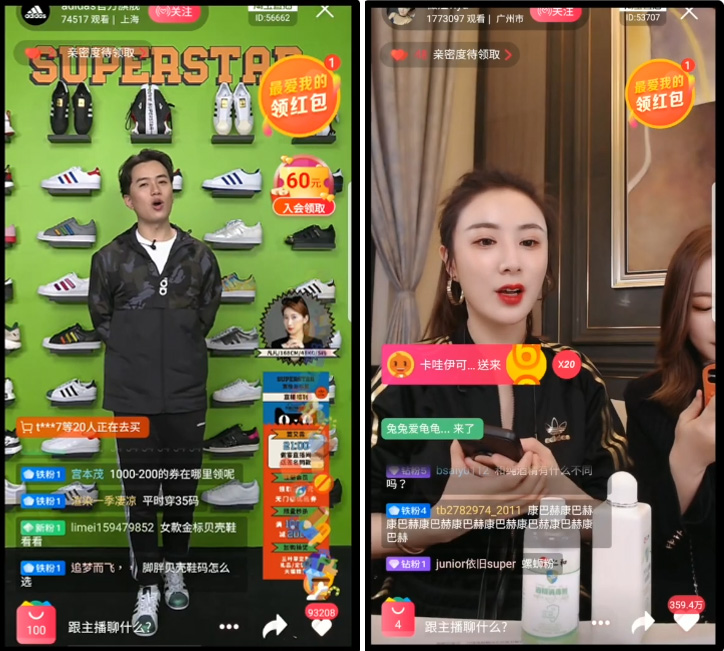By now, it is not uncommon for us to shop online for clothing, gadgets, and homeware.
Yet in recent years, a new format of e-commerce has emerged in China – live selling.
In what seems a nod to old school in-person auctions, witty, quick-talking live sellers — often broadcasting from the comfort of their homes — parade different wares while interacting in real-time with viewers on the platform’s chat function.
Depending on the individual seller, the stream might involve product demonstrations, catwalks, and some banter.
With its one-two punch of entertainment and instant purchase, live selling has quickly proved a hit with shoppers.
In 2020, Alibaba’s live selling platform, Taobao Live, posted about US$7.5 billion (S$10.17 billion) in total transactions just 30 minutes into its Single’s Day presales campaign in China.
A survey by Alixpartners from the same year found that over 80 per cent of Chinese consumers planned to make purchases from live sellers during the actual sales period.
 Screengrab from Alibaba Group’s YouTube Channel
Screengrab from Alibaba Group’s YouTube Channel
Today, 35 per cent of all e-commerce in China is done through live selling.
Such staggering numbers compelled McKinsey to dub live selling “the next wave of the e-commerce revolution”, capping off a meteoric rise that started in 2016 when Taobao Live debuted.
Low barrier to entry when brick-and-mortar sales are falling
But it isn’t just China where live sellers are taking over.
Here in Singapore, live selling is increasingly gaining prominence, as evidenced by the numerous vendors who have entered the market.
This includes Manne & Co, an outfit that specialises in the curation of clothing and accessories for its predominantly female audience.
“A few years back, we noticed the decline in brick-and-mortar sales while e-commerce began to grow and flourish,” said Manne & Co’s founder, who goes by the on-screen name Race.
 Image from Manne & Co’s Facebook page
Image from Manne & Co’s Facebook page
“One of the burgeoning trends was selling through live streams. However, some sellers then did not offer live bidding.”
Enter Manne & Co with a move that seems to have paid off. The live sellers now host weekly sessions on Facebook, with some attracting more than 30,000 views.
During streams, a host presents and models different objects of fashion for the viewers, while moderators pin important information like measurements in the comments.
Viewers take part by asking questions in the chat and placing bids for items they take a liking to.
“Starting off as a platform that sells products through live streams definitely saved us from some of the spatial and financial restrictions that store owners might have,” said Race.
With such flexibility, Manne & Co have started venturing past just fashion offerings; today if you happen to stumble upon a stream, you might see them live selling a wide array of products from various categories including food, home and living, beauty and health.
Building rapport and affinity
Manne & Co’s diversification serves as evidence of the potential that live selling has to reach wide audiences with all sorts of products.
According to Upmesh, a local live selling platform, while the practice initially drew fashion retailers, live sellers are increasingly venturing into other products.
“They’ve built up a very strong rapport with their audience and their buyers trust them to introduce new products to them even outside of the fashion space,” said Upmesh’s CEO Wong Zi Yang.
This relationship between seller and buyer perhaps explains the success of live selling.
For many viewers, watching live sellers has become a form of entertainment or even a regular hobby; it's not too dissimilar from the throngs of fans livestream gamers attract.
A shopper finds a live seller that they resonate with, possibly enjoys the seller’s sense of humour or personality, and finds entertainment value in demonstrations or cooking shows some of the sellers put on.
Through watching their streams and interacting with them, they eventually develop a sense of loyalty and affinity.
There is something reassuring about buying from someone you feel familiar with, as opposed to a faceless shop based in who-know-where.
“[Viewers] build up relationships with the sellers over time and there's very strong retention as a result,” explained Wong.
What the best live sellers understand
Correspondingly, it’s the sellers that understand the psyche of the audience that tend to find success.
“The best live sellers realise that the audience is not there primarily because of the product, but because they enjoy the engagement and process of shopping live,” said Wong.
“More often than not, a successful live seller goes above and beyond to interact with the viewers, sometimes even focusing more on the entertainment than the sale itself.”
It’s an observation that’s evident in even the briefest of viewings of Daniel Tay’s performances.
The founder of bake and cake shop Old Seng Choong, Tay has more recently taken the brand online with energetic live selling streams that really seem more like cooking shows.
 Image from Old Seng Choong’s Facebook page
Image from Old Seng Choong’s Facebook page
In a recent stream that went to air in March, Tay cooked pasta and dished up — amongst other things — plates of pork belly sliders, bowls of Korean ginseng chicken, and scoops of ice cream.
All the while he bantered with commenters, whose quips were read out to him by an off-camera producer.
Everything that he had showcased in the stream was up for grabs.
“We make sure to provide demonstrations at our live selling sessions to show customers what exactly they can expect of their purchases,” said Tay.
“Live sellers often earn more than typical jobs,” said Wong.
“But more importantly, they put in an absurd number of hours, primarily in the back-office work such as the packing of goods.”
The money while enticing, Upmesh’s CEO further explained, may not be enough when considering the difficulty of the job and the full-time commitment it demands.
Scoring a good deal
So how can consumers get the most out of live selling and score themselves a good deal?
The key, according to Wong, is to find a live seller you like and allow yourself to be part of their community.
“Live” being the operative word means that you’ll have to tune in when sellers have their streams to participate in the shopping experience.
Sellers often advertise their sessions days before going live so you can look out for their posts on social media.
Simply following the seller on their social media platforms usually sets off a notification whenever they go live as well.
“Sellers will often reserve their best products and items for their peak periods — if you watch a live seller, grow with their community and participate, eventually you’ll know when to tune in to get hold of the good stuff,” advised Wong.
“And who knows, you might one day decide to try out live selling yourself!”
Upmesh is the World’s First Live Selling System that works on both Facebook Live and Instagram Live. One of the platform’s priorities is to make live selling more accessible by helping sellers to focus on going live.
“Our vision is that in future, anyone can become a live seller just by downloading our app and going live,” said Wong.
Find out more about Upmesh here.
To celebrate the live streaming app launch, Upmesh will be releasing a mini-game from now to 17th March with exciting prizes to be won.
Simply match items to the “customers” as quickly as you can within the time limit to rank yourself on the leaderboard and stand to win attractive prizes including a specially curated 2D1N staycation package at The Fullerton Hotel Singapore.
There’ll also be plenty of promo codes that you can redeem from Upmesh partner merchants.
This Upmesh-sponsored article has the writer on the hunt for a good deal.
Top image screengrabs from Old Seng Choong and Manne & Co’s Facebook pages
If you like what you read, follow us on Facebook, Instagram, Twitter and Telegram to get the latest updates.
